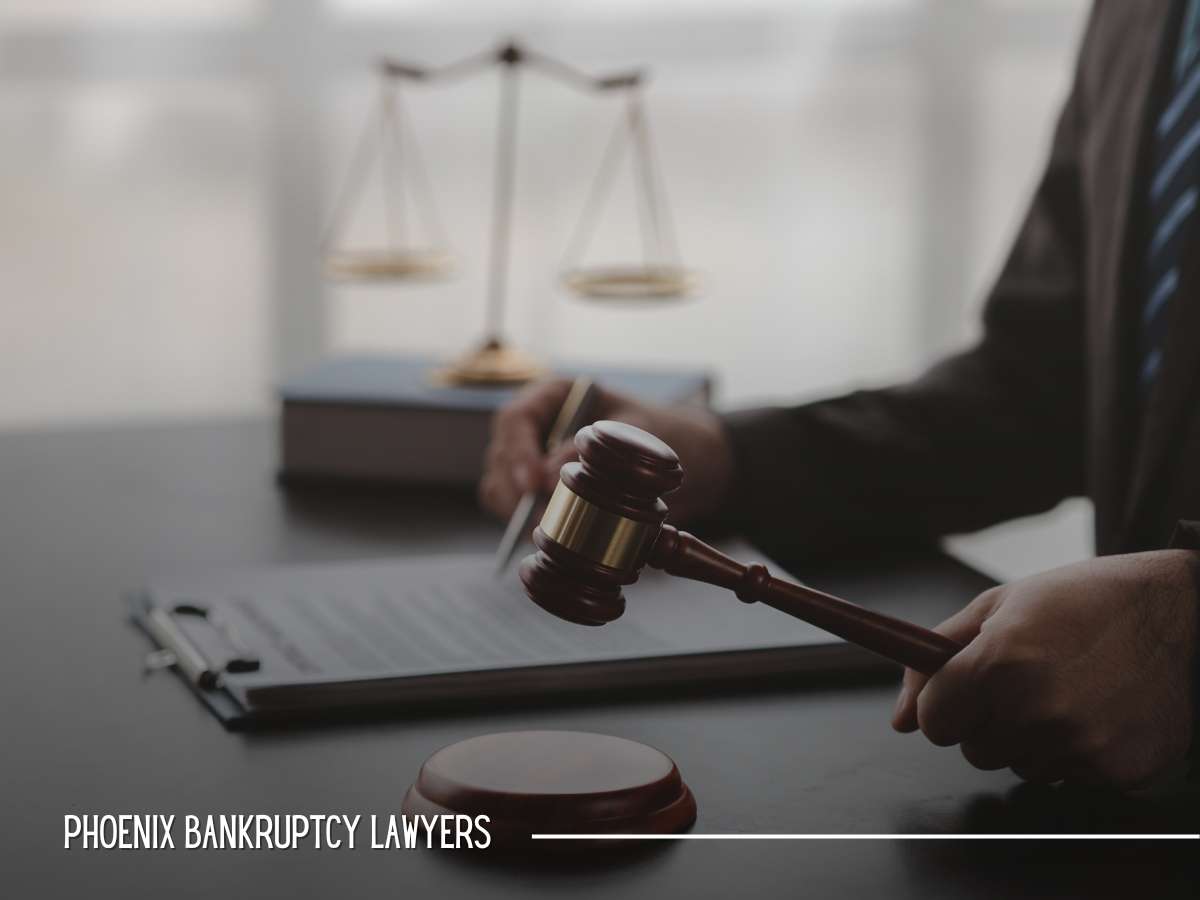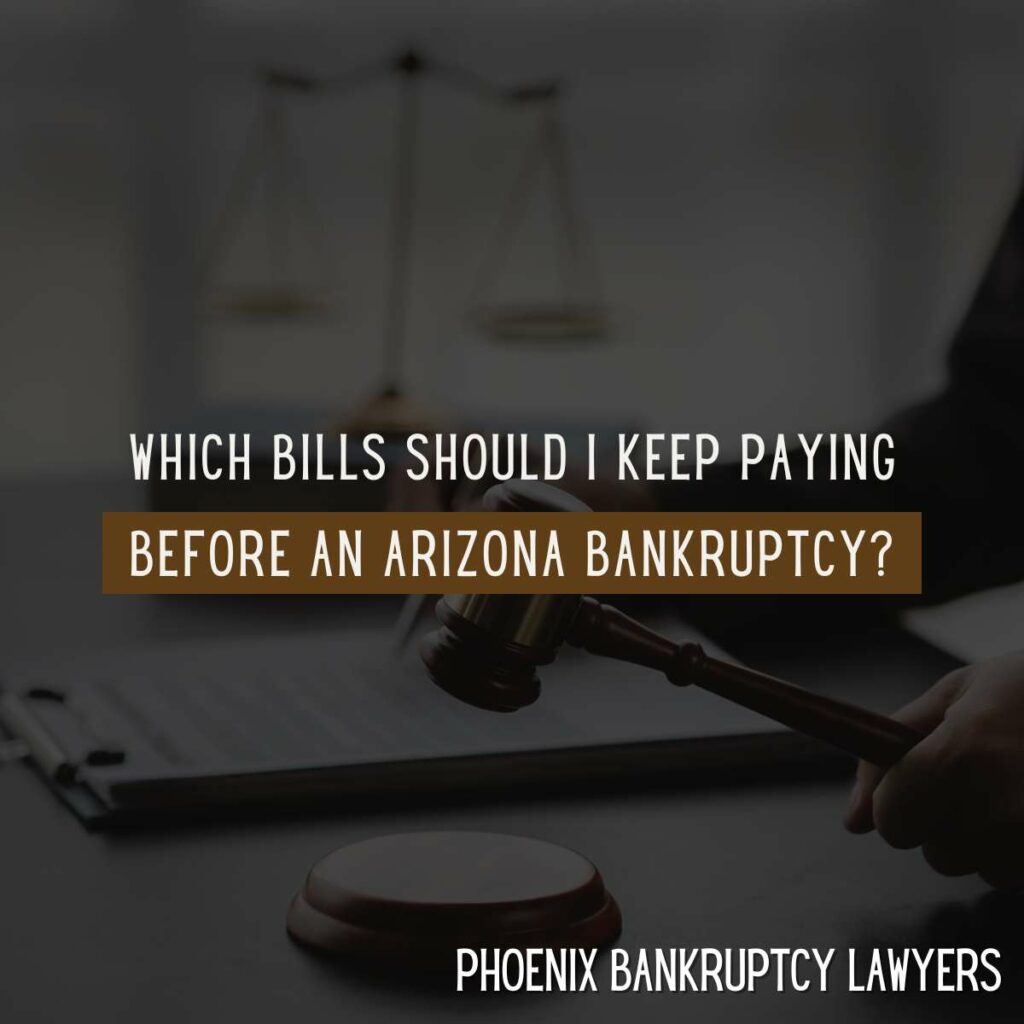There are so many factors and potential issues that can affect the best course of action in a bankruptcy case. A bankruptcy petition must be filed correctly so that the debtor can enjoy all of the benefits that bankruptcy has to offer. There are also certain actions that a debtor should engage in and avoid before filing a bankruptcy petition with the court. If you are preparing a bankruptcy filing, you should even be aware of which expenses you are paying. You can save money by stopping payment on some of your expenses, but it can create problems if you stop paying other bills. Read on to learn more tips about which bills to continue paying while you prepare to file for bankruptcy. If you have more questions or are seeking quality representation from a Phoenix bankruptcy attorney, call 602-509-0955 for your free consultation with our firm.

Mortgage
Filing for bankruptcy doesn’t erase secured debts. If you are still paying off the mortgage on your home, your mortgage is a secured debt and the house is a secured asset. Keep making your payments or your creditor will proceed with a foreclosure once your case is complete. Your creditors can also request permission from the court to proceed with a collection effort, such as a home foreclosure, while the case is still active through a Motion for Relief from the Automatic Stay.
Second Mortgage
Depending on your circumstances, continuing to pay a second mortgage may only be a drain on your resources. If you owe more on your home than it’s worth and have a second mortgage, Chapter 13 bankruptcy provides an opportunity to discharge that secondary home mortgage. If you are unsure about your home’s value compared to your mortgage balances or which chapter of bankruptcy you will file, you can discuss your situation for free with one of our Arizona bankruptcy lawyers by calling 602-509-0955.
Rent
Most renters prefer that their landlords never find out about their bankruptcy filings. This is possible because there is an option on bankruptcy petitions to exclude landlords from the debtor’s mailing list of creditors. But if a bankruptcy debtor wants to use their filing to cancel their rental lease, clearly the landlord will need to be notified. This option can be used when the debtor can no longer afford their rent and has a more affordable option available- the typical fees associated with breaking a lease will be wiped away with bankruptcy. Otherwise, failure to pay your rent during your bankruptcy can give your landlord cause to evict you once the bankruptcy- and the protections provided to you by the automatic stay- are complete. Back rent from a prior eviction is a debt that can be cleared by a bankruptcy filing.
Utilities
Unpaid utility bills can be discharged by a bankruptcy filing, but your utility providers don’t have to keep providing you with services if you discharge their bills in bankruptcy. For some bills, finding a new provider can be simple enough- for example, if you discharge your Verizon cell phone bill in your bankruptcy filing, you can switch to T. Mobile, AT&T, or another one of their competitors. But you won’t always have a choice in provider for every type of utility. If you move to a new home, you may only have one choice for utilities like electricity and home internet. Here, you may have to repay the balance owed to your utility provider to renew services despite your legal obligation to pay the debt already being cleared.
Insurance Coverage
Filing for bankruptcy won’t affect your health insurance, auto insurance, etc. Keep paying these monthly expenses so that your coverage doesn’t lapse- this will end up costing you more than staying current with your bills.
Credit Cards
What happens with your credit cards in bankruptcy will depend on the chapter that you file. They are wiped out by Chapter 7, but a Chapter 13 bankruptcy debtor may end up paying off some or all of their credit card debts in their payment plan. So if you plan to file for Chapter 13 bankruptcy and have a while to wait before filing but need an available balance on your credit card, you might want to make a payment. Otherwise, it usually isn’t strategic to continue paying off a credit card when you know that you will be discharging it in bankruptcy shortly. That isn’t to say that you should max out all of your credit cards- there are limits on spending before filing meant to prevent this type of abuse of the bankruptcy system. Don’t spend over $800 on luxury items in the 90 days before your bankruptcy filing. You should also avoid cash advances on your credit cards over $1,100 in the 70 days before your bankruptcy filing. If your credit card companies suspect you of fraud, you could be subject to one or more adversary proceedings during your bankruptcy case. For more assistance with your questions and concerns about your credit cards before filing for bankruptcy, call 602-509-0955 for your free phone consultation with our firm.
Personal Loans
Personal loans are unsecured debts that can be erased by bankruptcy. Some personal loans are through financial institutions, but they can also be from friends and family. Discharging your financial obligation to repay someone you know probably won’t discharge your moral obligation to pay back someone that you know. But it isn’t recommended to pay back your friends and family while preparing for a bankruptcy filing. This is considered a preferential payment because you would be paying back “insiders” in favor of your other creditors. If the trustee finds evidence of preferential payments in your bankruptcy petition, it can have disastrous consequences. The trustee can utilize a “clawback,” where the trustee would demand the return of any funds paid to insider creditors. This can create delays and extra costs in your case.
Child Support
Child support is not discharged by bankruptcy and is one of the only debts that is immune to the Automatic Stay. Only a Chapter 13 bankruptcy that fully pays back child support can stop a child support wage garnishment. Failure to pay child support doesn’t just create debt- it can have negative repercussions such as a driver’s license suspension or even criminal penalties. The expenses that should be paid in favor of child support are few and far between.
Have a Monthly Expense Not Described Here? Contact Our Firm for a Free Consultation.
Paying some bills when you anticipate a bankruptcy filing soon might be a waste. Your bankruptcy lawyer can help you strategize where to direct your funds while preparing for bankruptcy so that your case can proceed smoothly. Proper planning can help you get the most out of your bankruptcy. At Phoenix Bankruptcy Lawyers, we have represented countless clients in situations like yours to clear debts and move forward with a clean slate. When you’re ready to get started with your free consultation with one of our experienced Phoenix and Tucson bankruptcy lawyers, you can call 602-509-0955.
Phoenix Bankruptcy Lawyers
668 N. 44th St. Set 320
Phoenix, Arizona 85008
Phone: (602) 509-0955
